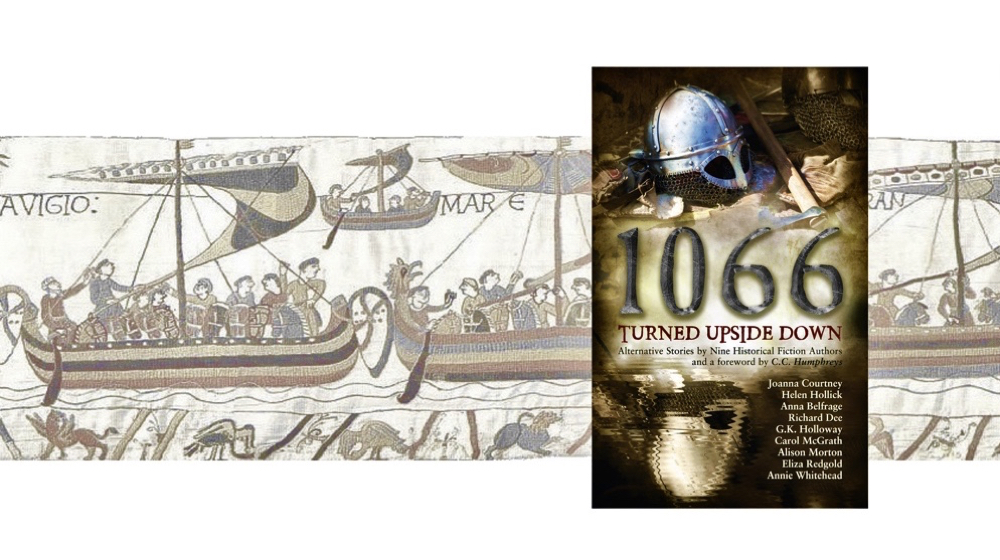As you’ve seen with the Roma Nova adventures, the whole idea of history taking an alternative path fascinates many people. I was delighted to be invited to join with a group of other authors a little while ago to explore that unique year in English history – 1066. Although there had been mingling of cultures and commerce before, this was the year that Saxon England died and the Norman ascendancy changed the country forever.
Like anybody else interested in history, I knew the general drift of the dramatic stories of courage, shipwreck, blackmail, invasion, self-belief and the romantic allure of ‘the last stand’. Inserting an 11th century Roman into that was a research challenge, but enormous fun. The Mitela of that period, Galla, had a thrilling adventure as well as making a significant intervention in ‘history’.
 My guest, Helen Hollick knows this period like the back of her hand. So I was intrigued (no, bursting with curiosity to be truthful) about why she had thought up the idea of alternatives to the history we know.
My guest, Helen Hollick knows this period like the back of her hand. So I was intrigued (no, bursting with curiosity to be truthful) about why she had thought up the idea of alternatives to the history we know.
So tell us, Helen, why?
Well why not? *laugh*. Seriously, speculative ‘what if’ fiction apart from being highly popular is immensely interesting as a subject of debate between anyone interested in history. What if the Romans had not invaded Britain (as they didn’t invade Ireland or too far into Scotland), what if the White Ship had not sunk – Henry I’s son would not have drowned, would have become the next king, therefore, no civil war between Stephen and Mathilda, no Henry II and no Plantagenets… What If Richard III had won at Bosworth, Katherine of Aragon had borne a healthy son to Henry VIII – the subjects are endless, and one alternative can lead to another. 1066 is a prime example, and 1066onites (is that a viable word?) like nothing more than speculating whatcould have happened if King Harold II had won that day on a battlefield seven or so miles from the coast at Hastings. Harold followers (as I am) also like to place him in a good light – he is an English hero to many, he died nobly, defending his kingdom against foreign invasion by a ruthless tyrant.
Do you think alternative history can be considered as historical fiction?
Oh yes, definitely! (The clue is in the word ‘fiction’). Fiction isn’t real, it’s made-up imagination, so why shouldn’t alternative ideas, scenarios, beginnings and endings with ahistorical feel or connection be regarded as quality fiction – providing it is written well and comes across as believable and plausible. Your own Roma Nova series, Alison, is a very good example. The events and the people are not real, it never happened or existed, Roma Nova is not a real place – but – it could have been. The stories are written so skilfully with meticulous research and exquisite detail that many a Roma Nova reader cannot understand why we cannot find the place on a map! And in a way, is not all historical fiction speculative and even alternative? No one knows for certain the actual facts, after all!
In the anthology 1066 Turned Upside Down, only one of the contributing authors writes in the alternative history genre – me. One other writes science fiction and you and Joanna Courtney managed the whole project. So how did you go about persuading other very well-respected writers of standard historical fiction to join in?
Oh I’m very good at twisting arms… Those of us who write ‘straight’ historical fiction jumped at the chance to change the course of history. In one of Joanna’s stories Harald Hardrada of Norway wins at Stamford Bridge in September 1066 (which could then lead to more debate: Duke William of Normandy had already landed on the south coast – would Hardrada have also fought him? Would he have won or lost? If he lost, the Norman Conquest would still have happened…) In one of my two stories included in the anthology, William’s fleet was defeated at sea by the English Navy (although I confess, this isn’t really speculation, I very firmly believe that this happened.) In a way all of the stories in the collection are ‘alternative’ in that they are all ‘what if’ based, but I specifically wanted you, Alison, aboard as I felt, at the time (a good few years ago now!) that the history of Roma Nova should be expanded. I remember saying to you: “But if Roma Nova was real, and it has survived until the present day its people would have been most concerned about the events of 1066? Surely they would have at least taken note, if not directly intervened?” And I also really wanted to know what Duke William would have thought of women holding the reins of power.
Do you have any plans to explore other ‘what ifs’?
Yes, although organising such things is not as easy as it first looks! I would like to explore the possibility of a follow-up ‘History Turned Upside Down’ instead of concentrating on a single year, have an alternative ‘what if’ for each century: What If Boudicca had won? What if Alfred The Great had lost to the Danes? What If the Black Death had come much later? What If … what if… the possibilities could fill several huge tomes. I’d like to have something in common tucked into each story, maybe a ring or a facial feature for a character, or each story must have a horse, dog or cat in it, or… well, you get the drift! I might get around to organising this project in 2022. Watch this space – applications to join in, welcome!
You can buy 1066 Turned Upside Down from these retailers: Amazon Nook Kobo Apple
Helen Hollick moved her family from north-east London in 2013 to an eighteenth-century North Devon farm house through being a ‘victim’ on BBC TV’s popular Escape To The Country show. Talk about changing your life’s time-line! She enjoys her new rural life, and has a variety of animals on the farm, including hens, ducks, geese, dogs, cats, goats, Exmoor ponies and her daughter’s string of show jumpers.
Helen became a USA Today Bestseller with her historical novel, The Forever Queen (titled A Hollow Crown in the UK) with the sequel, Harold the King (US: I Am The Chosen King) novels that explore events that led to the Battle of Hastings in 1066. Her Pendragon’s Banner Trilogy is a fifth-century version of the Arthurian legend, and she also writes a pirate-based nautical adventure/fantasy series, The Sea Witch Voyages. She has contributed to two short story anthologies, 1066 Turned Upside Down and Betrayal.
She’s now branching out into the quick read novella, ‘Cosy Mystery’ genre with her new venture, the Jan Christopher Mysteries, set in the 1970s, with the first in the series, A Mirror Murder incorporating her, often hilarious, memories of working for thirteen years as a library assistant. Another divergence from her personal time-line…
Her non-fiction books are Pirates: Truth and Tales and Life of A Smuggler. She also runs Discovering Diamonds, a review blog for historical fiction, a news and events blog for her village and the Community Shop, sometimes assists as ‘secretary for the day’ at her daughter’s regular showjumping shows – and occasionally gets time to write…
Connect with Helen
Website: www.helenhollick.net
Blog: www.ofhistoryandkings.blogspot.com
Twitter: https://twitter.com/HelenHollick @HelenHollick
Amazon Author Page (Universal Link) http://viewauthor.at/HelenHollick
Newsletter Subscription: http://tinyletter.com/HelenHollick
Facebook: www.facebook.com/HelenHollickAuthor
Discovering Diamonds Historical Fiction Review Blog :
https://discoveringdiamonds.blogspot.co.uk/
Alison Morton is the author of Roma Nova thrillers – INCEPTIO, CARINA (novella), PERFIDITAS, SUCCESSIO, AURELIA, NEXUS (novella), INSURRECTIO and RETALIO, and ROMA NOVA EXTRA, a collection of short stories. Audiobooks are available for four of the series. Double Identity, a contemporary conspiracy, starts a new series of thrillers. Double Pursuit, the sequel, is now out!
Download ‘Welcome to Alison Morton’s Thriller Worlds’, a FREE eBook, as a thank you gift when you sign up to Alison’s monthly email newsletter. You’ll also be among the first to know about news and book progress before everybody else, and take part in giveaways.














Leave a Reply